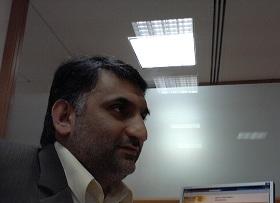Using AI to control energy for indoor agriculture
30 September 2024
Published online 4 April 2012

Following pro-democracy demonstrations in Bahrain, the government is claimed to have carried out a campaign of intimidation against academics and students. Several high-profile professors were arrested or fired from their jobs.
Masaud Jahromi is chairman of the Telecommunication Engineering Department, at Ahlia University in Manama, Bahrain. He was detained in the early hours of 14 April, 2011. He was freed 10-months later. On 20 March, 2012, Jahromi was reinstated to his previous post.
Jahromi describes his ordeal to Nature Middle East and recalls efforts to release him.
While everyone was sleeping, seven police cars and one white civilian car entered my family compound at around 2:30am. They broke the main door of my brother's villa and pulled him out through the broken glass injuring his knees in spite of his pleas to wait until he opens the door. They then broke through my main door and into my locked bedroom where I was sleeping with my wife and 8-year-old son. The police dragged me outside and forced me and my four brothers to lie on the floor where some of us were kicked — all in front of our families. Finally they handcuffed me, covered my face and took me away and confiscated several laptops, cameras and mobile phones.
After almost 20 days in prison, they had us all take blood tests. I was isolated from the rest of the group, later telling me I had Hepatitis C. A visiting doctor confirmed there was no reason for my isolation but it was two months before I was allowed to rejoin the others.
My first time in court came after 4 whole months of detention on 24 August, 2011. I was accused of "participation in an unauthorized rally".
I was released on bail at my second court session after 5 months. I had been suspended from my job at the university soon after my arrest and my salary stopped. On 31 January, 2012 the university decided to reinstate me, first as an instructor and then in my old position as chairperson on 20 March.
I was sentenced to four months of imprisonment but have appealed. I hope it works out.
I was away from political activities and interests since I serve society at an Islamic centre and not allowed to interfere in politics. I was on a business trip to Dubai from 14-17 February in 2011 with my family during the time of the popular protests. When the Crown Prince and heir apparent [Sheikh Salman bin Hamad al-Khalifa] called for dialogue with the demonstrators, I joined almost 400,000 people in a peaceful pro-democracy protest. A group of academics — including myself — issued a statement that supported the Crown Prince's call for dialogue.
In addition to me, several Ahlia University academics were investigated. I also know several academics from Bahrain University were persecuted but I am not sure if any of them were arrested.
According to the Bahrain Independent Commission of Inquiry, which was set up by the King of Bahrain to look into the incidents that occurred during the unrest, Bahrain University suspended academics, staff and students because they participated in lawful protests calling for the right of freedom of speech. During interrogation, several of the academics were questioned about their emails and their pictures while they were participating in protests and rallies.
I believe the international pressure had a great impact on facilitating my release — although on bail — and the significant role of a letter sent by Scholars at Risk [an international network of universities and colleges responding to attacks against scholars who are attacked because of their ideas], to the Bahraini government cannot be neglected, especially since it has been widely circulated by other parties.
Before my academic research career and my private business, I am a Bahraini wishing peace and democracy for my state. I believe that academics and scientists are part of the society and they should play their part as well-known and respected personalities calling for peaceful pro-democracy protests.
I firmly believe academics and scientists should be professional about this and not mix up between their academic duties and their right to participate in different society activities. They should avoid using university environments to spread their private expressions.
doi:10.1038/nmiddleeast.2012.49
Stay connected: